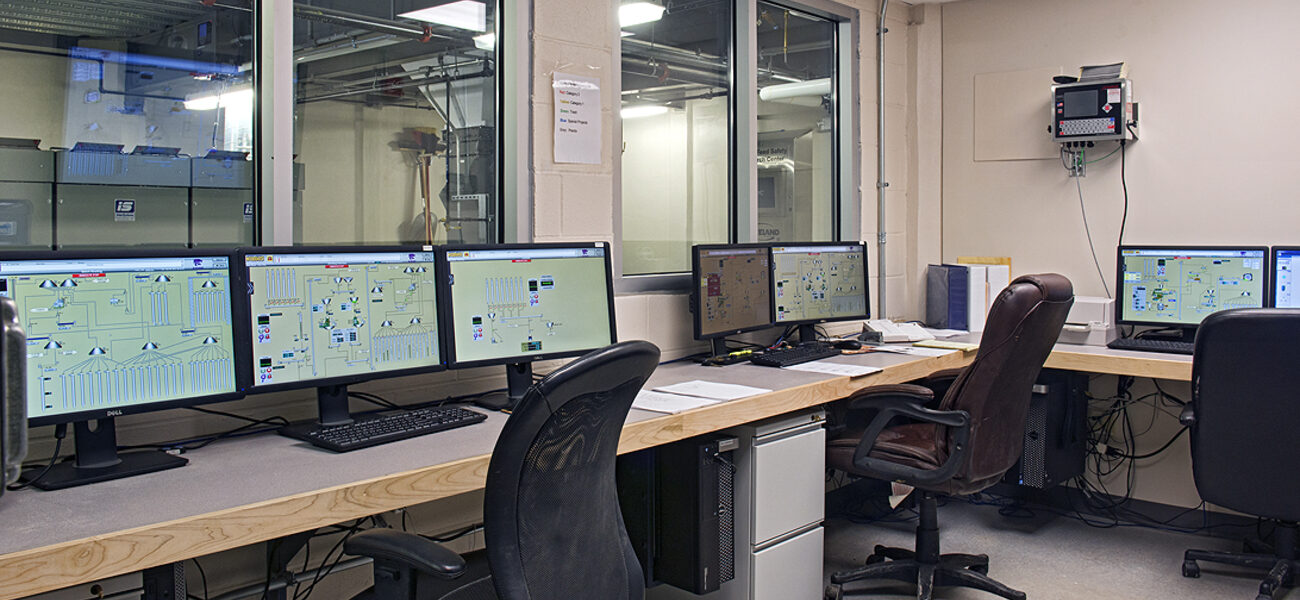In addition to massive grain processing and storage facilities, Kansas State University’s O.H. Kruse Feed Technology Innovation Center also contains a 1,200-sf BSL-2 lab for studying food-borne pathogens. The three-story high-bay Cargill Feed Safety Research Center (FSRC) is the only facility in the United States approved for feed-related research involving such pathogenic agents as Salmonella and E. coli. Previously, the University was not permitted to intentionally contaminate livestock feed with live pathogens because of the safety requirements. The new lab will allow researchers to study ways to sterilize or decontaminate animal feed.
Research focuses include:
- Feed processing technologies to sterilize feed and lower bacterial and viral introduction to livestock operations and the food chain.
- Creation of several test protocols to verify the safety of working with pathogens, and the containment of pathogens within the facility.
- Development of technology to produce feeds that contain live or modified-live virus vaccines. The FSRC is expected to be a critical link to the new NBAF laboratory investigation area of direct-fed vaccines for both domestic livestock and wildlife.
In order to conduct this controlled research, the Cargill Feed Safety Research Center contains a pilot feed mill designed and built to BSL-2 specifications and equipped with controlled access through an air-lock door system, negative air pressure control, HEPA air filtration system, stainless steel construction, and open and Clean-in-Place (CIP) designs for conveyors and fixed equipment. The temperature of the entire BSL-2 facility can be raised to 140 degrees and held for 24 hours with little human intervention for additional microbial control. This self-contained pilot feed mill laboratory contains small production-sized equipment such as mixers, a pellet mill, a long-term conditioner, and a pellet cooler. Additional equipment such as extruders and other process equipment can be installed on a temporary basis for pathogen research as needed.
The new Feed Technology Innovation Center, which replaces two older mills on the Grain Science and Industry Campus, is co-managed by the University’s Grain Science & Industry Department and the Department of Animal Sciences & Industry. It offers the only undergraduate feed science and management program in the United States, covering all traditional feed processes, as well as novel processes for aquaculture feed, companion and zoo animal food production, and research.
The Center produces all the research feeds needed for the Department of Animal Science on its research farms, and permits contract and graduate-level research and feed-related teaching performed by the Department of Grain Science and Industry, the only degree-granting program in the U.S. for undergraduate degrees in feed science and management, and milling science and management. This center is conservatively expected to double the University’s current feed science enrollment. Approximately 6,000 tons of ingredients pass through the facility each year.
Future plans for the center include a two-story, 12,800-sf education wing, pending additional funding. The new wing—which will contain two analytical laboratories, meeting spaces, and a bio-refinery for research of renewable cellulosic bio-resources, such as wheat straw, switch grass, and other biomass materials—will serve as the public face of the facility.
| Organization | Project Role |
|---|---|
|
Architect
|
|
|
McCownGordon
|
Builder
|
|
Facility Engineering Services, PA
|
Feed Mill Design Consultant
|
|
Orazem Scalora
|
MEP
|
|
Bob D. Campbell
|
Structural Engineer
|
|
FSC, Inc.
|
Code Consulting
|
|
Schwab Eaton
|
Civil Engineer
|
|
Acme Dock
|
Overhead and Vertical Rise Doors
|
|
ASI Industrial
|
Design-Builder for Process Equipment
|
|
Bamford Fire
|
Fire Suppression
|
|
Binswanger Glass
|
Windows
|
|
Commercial Openings
|
Doors, Frames, Hardware
|
|
Faith Technologies
|
Electrical Design and Installation
|
|
HiTech Interiors
|
Studs and Gyp Board
|
|
Midland Steel
|
Structural Steel
|


